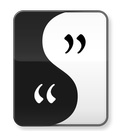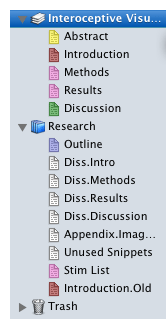Writing Tools: Scrivener

Writing is one of the most difficult things that I have to do as a scientist. The problem is that writing is a necessary part of both grant applications and article publication, meaning that we really do live and die by the impact our words have on people. That fact is rarely lost on me as I stare at the laptop screen silently begging my mind to, please, let me have one more great mediocre sentence.
Fortunately I have been able to find several tools that help the writing process along. A good outline of the project before I begin writing is probably the biggest step I have taken in making the final product more coherent. I will write about OmniOutliner sometime in the near future. Also helpful has been the habit of keeping all of my experiment notes in a single notebook, putting relevant information at my fingertips when the act of writing begins. Probably the single most beneficial tool I have found is the writing project management software Scrivener. Having this one program that I can live in while I write has made a gigantic impact on my productivity.
If you are unfamiliar with programs like Scrivener allow me to set the stage. There has been a small revolution in the writing software community in the last several years regarding the ‘bigger is better’ mentality of applications. A perfect example of a ‘bigger’ app is the ubiquitous Microsoft Word. It does everything: page layout, tables, change tracking, you name it. A central thesis of many new writing programs is that these tools are a bit much when you need to be productive and should be reserved for the final stage of production. For every 10 minutes that you spend futzing with the font size of your text you have now lost 10 minutes of writing time.
I have been through several writing programs in the last three years looking for the one I was most at home in. I completed my PhD specialist examination (quals) working in Ulysses, which was a gigantic step forward in terms of organization and output. About a year after that I was seduced by the full screen editing ability of WriteRoom. The psychological impact of eliminating background clutter and temptation was a godsend for an ADD bloke such as myself. Still, I kept searching for something just a bit better – a program that worked the way I expected and really anticipated my needs.
In hindsight I am not sure how I stumbled upon Scrivener. Odds are such that I probably found a link to it at lifehacker.com or www.tuaw.com. Since that time I have come to feel that it is my secret weapon in the battle of words. It has just the right balance of tools and features to keep me happy without going overboard into frivolity. Here are some of my favorite parts of the program:

* Text availability. Sometimes when I am working on a discussion section I will remember something that needs to go in the methods of a paper. In Scrivener these sections are set up as separate text files, which gives me instant access to their contents. I can flip back and forth between the sections in a way that has very little impact on my concentration, which is important. I can flip over, make the edit, and return to where I left off without rebooting my thought process, if that makes sense.
* Binders. Having other research files readily available dramatically helps the process along. I can have outlines, text snippets, alternative versions of paper sections, figures, tables, and photos all just a click away. What was the p-value of that insula region? Click. What stimulus words did I use in the 4th block? Click. What did I think I should be saying in this section?? Click. This is one of the more powerful features of Scrivener, but also one that is the most simple: you never have to leave it. Once your Scrivener document is preset with the items you will need access to you never have to stray out of its window.
* Full screen editing. I don’t always need this feature, as I will usually just maximize the document window to take up the whole screen, but there always comes a point in my sessions when I realize that I am spending more time wandering about in Firefox than writing or editing. When I catch myself I will take a few minutes to stretch, get a glass of water, and then return to Scrivener in full screen mode. Distractions out, productivity in.
* Snapshots. Sometimes I get the great idea to delete entire paragraphs of text so I can start over with a better foundation. This often works well, but when it doesn’t I can always go back to an earlier snapshot of a document for a little cut and paste action. This feature combined with Apple’s Time Machine are lifesavers.
* Progress measurement and status labels. Writing can be a very difficult endeavor. I need to know that I am making progress toward my goals to have the motivation to finish. Like every other editing program Scrivener gives you the word count of each of your text sections, but it also allows you to set word count goals, or session word count goals. I can have my end goal for a paper be 5,500 words, but tonight I just need to write 800 of those. I also appreciate that I can set the status of each document as a reminder of what stage it is at. Files can be first/revised/final drafts, still to do, or I can invent my own status label. I have been known to label a document as ‘needs a miracle’.
Scrivener is a powerful piece of software, and I know in the end I am only scratching the surface of all it can do. Still, compared to the likes of Word and InDesign it is a targeted app that aims to do one thing really well: getting that final draft out the door. I have been working with it for about nine months now and I can honestly say that it is the only writing application I have ever been excited to launch, every time. My dissertation definitely would have gotten done without it, but I like to think that Scrivener made my life that much better while I was knee-deep in it. That is about the highest compliment I can give to a piece of software. Give it a try: http://www.literatureandlatte.com/scrivener.html

One Response to “Writing Tools: Scrivener”
Nathan P. - January 18th, 2011
Could you perhaps explain why you chose Scrivener over Ulysses? I’m examining both of them right now, and although one is clearly a necessity in my workflow, I am not sure why to choose one over the other.
Leave a Reply
You must be logged in to post a comment.